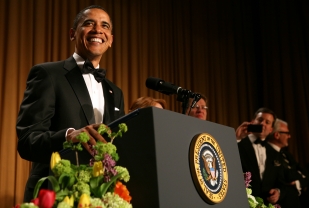The Situation and the Story: Press Corps Parties While White House Makes History
It was Wednesday morning at 9:47 a.m. in the White House Press Briefing Room. The president of the United States of America, Barack Obama, took the podium. Major television networks had interrupted coverage to broadcast the president's address. "Now, let me just comment, first of all, on the fact that I can't get the networks to break in on all kinds of other discussions," he said. "I was just back there listening to Chuck [Todd, of NBC News]; he was saying, 'It's amazing that he's not going to be talking about national security.'" He pointed into the crowd: "I would not have the networks breaking in if I were talking about that, Chuck, and you know it." Someone from the press corps shouted: "Wrong channel." The room laughed, and then quieted to hear the American president talk about the fact that he was born in the United States, and had a birth certificate to prove it.
Journalists from newsrooms, magazine offices and studios across the country digested the information, repackaged it appropriately for their readers and viewers and moved on to the next order of business. For a select few, that meant planning for the weekend's events, the most high profile of which was the annual White House Correspondents Dinner—a tradition begun in 1920 that brings together the press and the people they purportedly cover for an evening of entertainment, shmoozing and, as the name implies, dinner. It is the nexus of a series of events, mostly cocktail parties and a few selective brunches, that extend throughout the weekend and are hosted by various media organizations and attended by Washington insiders, journalists—and increasingly, California-based attendees with a presumed interest in public policy, like Kim Kardashian and the Jonas Brothers—some of whom are invited as guests to the dinner by media organizations represented there.
At 4:52 p.m. on Thursday afternoon, The Observer emailed The New York Times' executive editor, Bill Keller, to ask whether the dinner—an affair wherein journalists who are tasked with covering beltway power spend an evening socializing with it—is at worst, an outright conflict of interest, and at best, well ... a bit unseemly. Former New York Times columnist Frank Rich, who recently left the paper to become a columnist for New York magazine, had criticized the paper's attendance at the event and was said to be influential in curtailing its official appearances a few years prior. (Mr. Rich, who was out of the country, did not respond to The Observer's requests for comment.) The Observer wondered whether Mr. Rich's departure changed the paper's thinking on the issue. "GROAN," Mr. Keller responded via e-mail. "SUCH a done subject. Why don't you try Dean Baquet in the Washington Bureau? I'm sure he'd LOVE to answer your questions."
Seven minutes later, The Observer received an e-mail from Washington bureau chief Dean Baquet. "Here is the deal," Mr. Banquet wrote. "We are not being holier than thou, or criticizing anyone who chooses to go. But we came to the conclusion that it had evolved into a very odd, celebrity-driven event that made it look like the press and government all shuck their adversarial roles for one night of the year, sing together (literally, by the way) and have a grand old time cracking jokes. It just feels like it sends the wrong signal to our readers and viewers, like we are all in it together and it is all a game. It feels uncomfortable."
An hour earlier, in the Situation Room of the White House, senior intelligence advisers explained to the president that there was a 60 to 80 percent chance Osama bin Laden had been located in a compound in Pakistan that the C.I.A. had been scouting for months, and the president needed to decide whether he would move ahead with an air strike or a ground strike, or if he would wait to gather further intelligence.
Around 7 p.m. that evening, Mr. Baquet followed up: "I don't want to trash the small and medium size papers that really care about this. It's just the way we feel." (For the record, The Observer is a small-size paper, and does not officially attend the dinner.)
- Tags:
- Media |
- The Daily Transom |
- Barack Obama |
- Bill Keller |
- Cee-Lo |
- David Remnick |
- Donald Trump |
- Eliot Spitzer |
- Frank Rich |
- Great Views |
- Kim Kardashian |
- Media |
- Osama bin Laden |
- Phil Griffin |
- Rachel Maddow |
- Sarah Palin |
- Saturday Night Live |
- Spilled Butter |
- White House Press Corps |
- WHPCD

















